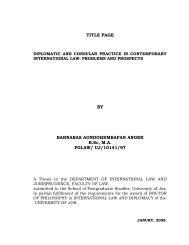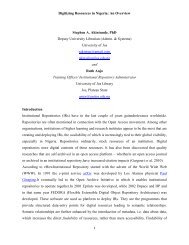Professor Atiene Solomon Sagay - University of Jos Institutional ...
Professor Atiene Solomon Sagay - University of Jos Institutional ...
Professor Atiene Solomon Sagay - University of Jos Institutional ...
Create successful ePaper yourself
Turn your PDF publications into a flip-book with our unique Google optimized e-Paper software.
espectively. Lack <strong>of</strong> antenatal care (Unbooked status) and illiteracy were the significant<br />
determinants <strong>of</strong> maternal mortality.<br />
When we compare these maternal mortality figures with 3/100,000 deliveries in Sweden,<br />
4/100,000 deliveries in Spain, 5/100,000 deliveries in Switzerland and 8/100,000 deliveries in<br />
the United Kingdom (WHO 2005), they become terribly disturbing. These staggering<br />
maternal mortality figures are a reflection <strong>of</strong> the premium placed on the lives <strong>of</strong> women in<br />
this country. These women do not die <strong>of</strong> diseases that can’t be treated or complications that<br />
can’t be prevented. To quote Mahmoud Fathalla, former president <strong>of</strong> the International<br />
Federation <strong>of</strong> Obstetricians and Gynecologists, “they die because societies have yet to determine<br />
that their lives are worth saving”. Sadly, if a woman does not survive, her child has little<br />
chance <strong>of</strong> survival.<br />
Vesico-Vaginal Fistula (VVF)<br />
For every woman who dies at childbirth, 15 to 30 live but suffer chronic disabilities, the<br />
worst <strong>of</strong> which is obstetric fistula. Each year some 50,000-100,000 women sustain an<br />
obstetric fistula in the act <strong>of</strong> trying to bring forth new life. Fistula is a preventable and<br />
treatable condition, one that no woman should have to endure. Yet more than two million<br />
women remain untreated in developing countries.<br />
Obstetric fistula is the most devastating <strong>of</strong> all pregnancy-related disabilities. It usually occurs<br />
when a young, poor woman has an obstructed labour and cannot get a Caesarean section<br />
when needed. The obstruction can occur because the woman‘s pelvis is too small, the baby‘s<br />
head is too big, or the baby is badly positioned. The woman can be in labour for three days or<br />
more without medical help. The baby usually dies. If the mother survives, she is left with<br />
extensive tissue damage to her birth canal that renders her incontinent.<br />
The results are life shattering. The woman is unable to stay dry and the smell <strong>of</strong> urine or<br />
faeces is constant and humiliating. Nerve damage to her legs can also make it difficult to<br />
walk. Rather than being comforted for the loss <strong>of</strong> her child, she is <strong>of</strong>ten rejected by her<br />
husband, shunned by her community and blamed for her condition. Women who remain<br />
untreated not only face a life <strong>of</strong> shame and isolation, but may also face a slow, premature<br />
death from infection and kidney failure. While some women receive support from their<br />
families, others are forced to beg or turn to sex work for a living.<br />
During obstructed labour, the prolonged pressure <strong>of</strong> the baby‘s head against the mother‘s<br />
bony pelvis cuts <strong>of</strong>f the blood supply to the s<strong>of</strong>t tissues <strong>of</strong> her vagina, bladder and rectum that<br />
are trapped between the harder (bony) structures. The injured s<strong>of</strong>t tissue soon rots away,<br />
leaving a hole, or fistula. If the hole is between the woman‘s vagina and bladder, she loses<br />
control over her urination, and if it is between her vagina and rectum, she loses control <strong>of</strong> her<br />
bowels. Reconstructive surgery can mend this injury, but most women are either unaware that<br />
treatment is available or cannot access or afford it. Fistula surgical repair has up to 90 per<br />
cent success rates and costs between N20, 000 to N60, 000. In supported VVF repair and<br />
rehabilitation centres, most services are provided free <strong>of</strong> charge. ECWA Evangel Hospital is<br />
one such centre in <strong>Jos</strong>, Nigeria.<br />
In the words <strong>of</strong> DR. ANDREW ARKUTU ―An obstetric fistula is more than a hole. For those<br />
afflicted, it is a comprehensive social and psychological disaster, resulting from a dramatic<br />
failure in obstetric care.‖<br />
10













